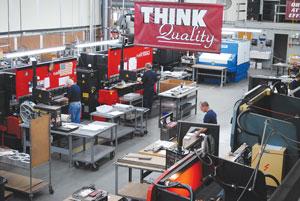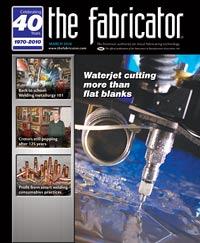Senior Editor
- FMA
- The Fabricator
- FABTECH
- Canadian Metalworking
Categories
- Additive Manufacturing
- Aluminum Welding
- Arc Welding
- Assembly and Joining
- Automation and Robotics
- Bending and Forming
- Consumables
- Cutting and Weld Prep
- Electric Vehicles
- En Español
- Finishing
- Hydroforming
- Laser Cutting
- Laser Welding
- Machining
- Manufacturing Software
- Materials Handling
- Metals/Materials
- Oxyfuel Cutting
- Plasma Cutting
- Power Tools
- Punching and Other Holemaking
- Roll Forming
- Safety
- Sawing
- Shearing
- Shop Management
- Testing and Measuring
- Tube and Pipe Fabrication
- Tube and Pipe Production
- Waterjet Cutting
Industry Directory
Webcasts
Podcasts
FAB 40
Advertise
Subscribe
Account Login
Search
Being fair and competitive
Boston-area shop quotes consistently, regardless of economy
- By Tim Heston
- September 2, 2011
- Article
- Shop Management

Salem Metal Fabricators’ shop floor in Middleton, Mass., slowed significantly with the economy. Still, some customers have been with the company for decades, and business has picked up considerably this year.
Jason Vining remembers working summers at his father’s shop, Salem Metal Fabricators, north of Boston. He swept the floor, did office work, and even ran the turrets and press brakes on occasion. Most significant, he remembers the shop servicing some of the same customers as it does today, two decades later. His father, Jim Vining, launched the metal fabrication business in 1970, and through the years built up the shop’s reputation for quality and on-time delivery.
That’s why I wasn’t surprised to hear his son, now company president, say this: “We quote a fair and competitive price, regardless of economic conditions. We don’t gouge people when everyone is busy, and we don’t drop prices significantly when times are slow. We’ve been around 40 years, and we’ve always been willing to walk away from work that we feel is below what we should be getting for it.”
Those words could have come from many shop managers doing business in a playing field full of metal fabricators hungry for business. Jason conceded that the shop has quoted more aggressively as work volumes from the shop’s existing, long-standing customer base dwindled, especially during the first half of 2009. But he hasn’t gone so far as to quote just above, at, or below cost. “That’s the worst kind of business you can have.”
It can be a dangerous strategy for a fabricator, Jason said. Sure, the strategy may bring work in the door, but then what? Even “making it up on volume” doesn’t have the effect it once did. As setup times and production cycles shrink, and as shops adopt efficient material handling and part flow, piece-part costs don’t plummet with higher volumes as dramatically as they once did. Besides, these days who can count on volumes growing over the long term?
Like others, Salem Metal Fabricators has reduced setup and streamlined part flow. Salem’s strategy has involved shortening the time between receiving the order and getting paid for it. To do it, the shop invested in new software and equipment.
The company’s Epicor enterprise resource planning (ERP) software helps track jobs on the floor. The software was Jason’s first significant mark on the business. Before taking the helm in July 2009, Jason spent 11 years as company vice president, when he was in charge of integrating ERP into the company’s production system. Workers now can track where parts are, how long they take to produce, and mine data to improve overall efficiency and quality.
That’s technology Jason’s father, now executive vice president, probably couldn’t have imagined when he launched the business. Still, the story doesn’t entirely fit the stereotypical narrative of the software-savvy offspring bringing a shop into the 21st century. When it came to machine tools, Jim didn’t shy away from advanced technology, and his son has followed that tradition. In 2009—not a stellar year by any account—the shop purchased a 4-kW Amada laser and a 4-kW Mitsubishi laser with material loading capability.
“Keeping up with advancements in technology has always been an integral part of the business,” Jason said. “Working here as vice president for 11 years, I wasn’t about to come onboard [as president] and change everything over. The system worked very well. I just saw a manual system [of paperwork]. The way things were headed, it was very important for us to integrate a solid software system.”
Salem Metal fared better than many last year. The shop made it through seriously slow times during the first six months with no significant layoffs. The shop’s 43 employees did agree to take some vacation days that they otherwise wouldn’t have, but through it all, most kept their jobs.
It didn’t hurt that the job shop has a strong foothold in the medical industry, fabricating sheet metal components for defibrillators, blood-analyzing systems, pumps for angioplasty, and other parts. Still, even the shop’s medical customers slowed the flow of orders. So more than ever before, shop managers were on the hunt to broaden their customer base. Fortunately, since August business has picked up a fair amount, as has the overall economy. One big question remains, of course: Is this uptick sustainable?
The shop’s been through worse, and employees need only look at one of the company’s oldest turret presses as a reminder. The turret was refurbished after a 1986 fire, which destroyed the firm’s original Salem facility. The fire was caused by a dry deburring and graining machine, which sent metal dust into a 55-gallon drum. When dry steel dust mixed with aluminum dust, disaster struck. After the fire, Jason’s father built a new, 30,000-square-foot facility a few miles to the northwest, in Middleton, Mass.
“As my father has told me, all the employees stuck around,” Jason said. “They didn’t want to work anywhere else. They stuck by my father. He’s always treated people very well over the years, and he needed them then more than ever.”
Both employees and customers have stuck by the company for decades. So how has this small fab shop maintained such continuity, through fire and recession? As Jason put it, “Trust and fairness.”
Salem hasn’t made it to 40 years by doing low-margin or at-cost work. According to Jason, the shop bids aggressively but realistically. Ultimately, this ensures the long-term viability of both Salem Metal and its customers.
More than anything, it’s fair.
About the Author

Tim Heston
2135 Point Blvd
Elgin, IL 60123
815-381-1314
Tim Heston, The Fabricator's senior editor, has covered the metal fabrication industry since 1998, starting his career at the American Welding Society's Welding Journal. Since then he has covered the full range of metal fabrication processes, from stamping, bending, and cutting to grinding and polishing. He joined The Fabricator's staff in October 2007.
Related Companies
subscribe now

The Fabricator is North America's leading magazine for the metal forming and fabricating industry. The magazine delivers the news, technical articles, and case histories that enable fabricators to do their jobs more efficiently. The Fabricator has served the industry since 1970.
start your free subscription- Stay connected from anywhere

Easily access valuable industry resources now with full access to the digital edition of The Fabricator.

Easily access valuable industry resources now with full access to the digital edition of The Welder.

Easily access valuable industry resources now with full access to the digital edition of The Tube and Pipe Journal.
- Podcasting
- Podcast:
- The Fabricator Podcast
- Published:
- 04/16/2024
- Running Time:
- 63:29
In this episode of The Fabricator Podcast, Caleb Chamberlain, co-founder and CEO of OSH Cut, discusses his company’s...
- Industry Events
16th Annual Safety Conference
- April 30 - May 1, 2024
- Elgin,
Pipe and Tube Conference
- May 21 - 22, 2024
- Omaha, NE
World-Class Roll Forming Workshop
- June 5 - 6, 2024
- Louisville, KY
Advanced Laser Application Workshop
- June 25 - 27, 2024
- Novi, MI































